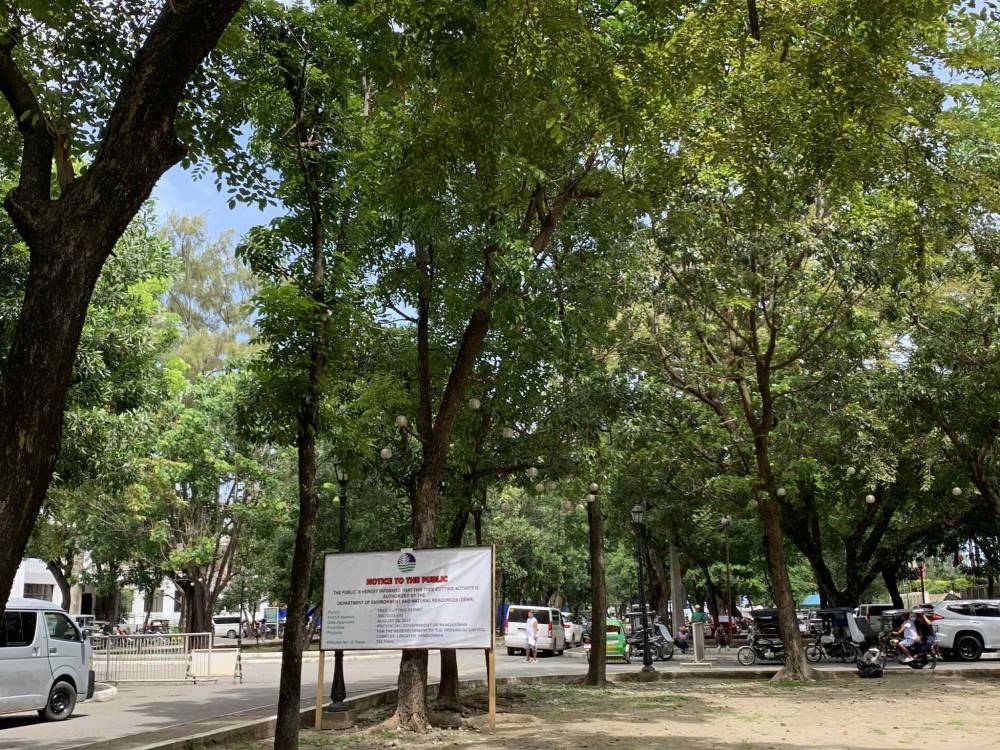Group opposes cutting of 192 trees at Pangasinan Capitol

LINGAYEN, PANGASINAN—The environmental group Pangasinan Native Tree Enthusiasts Inc. (PangNTE) has expressed serious concern over the planned cutting of 192 native and exotic trees within the Capitol compound in Lingayen, a move already granted a permit by the Department of Environment and Natural Resources (DENR).
According to the signage posted beneath the trees, the DENR issued Tree Cutting Permit No. 0807-2025-013 to the Pangasinan provincial government on Aug. 8, allowing the removal of trees, which are from 10 to 50 years old, as part of the ongoing development of the Capitol grounds.
Gov. Ramon Guico III earlier explained the project aims to transform the area into “something of cultural substance, a place where families can enjoy frolicking on weekends, iconically inspiring, intellectually engaging, and historically nostalgic.”
Act with caution
The development at the rear portion of the Capitol complex had actually started, including the construction of the Reflecting Pool and Interactive Fountain, described as “a well-planned project that went through a technical and legal process.”
During the groundbreaking ceremony on Nov. 8, 2023, Guico described the project as “one of the significant undertakings to transpire that will spur economic growth and development and define the vision of the present administration to make Pangasinan a premier province of great opportunities, sustained socio-economic growth, and a place where one can experience life at its best.”
However, PangNTE president Celso Salazar said that while they acknowledged that “destruction cannot be prevented in the pursuit of development,” he urged authorities to act with caution.
“We can always mitigate the negative impact by removing only exotic species and, by all means, earthball native species and transferring them to available spots—or better, spare them,” Salazar told the Inquirer.
Relocate
In separate letters dated Sept. 15, the group cited alarming environmental indicators, including the World Risk Index 2023 and Philippine Atmospheric, Geophysical and Astronomical Services Administration’s ranking of Pangasinan as having the highest heat index nationwide. The letters were addressed to Guico and engineer Noriel Nisperos, Community Environment and Natural Resources officer of Central Pangasinan.
“This highlights the urgency of protecting carbon sinks, such as trees and wetlands. In this light, we respectfully raise our concern over the proposal to cut down hundreds of standing trees,” read the letter signed by the group’s 1,800 members.
PangNTE proposed that the affected trees be relocated using earthballing techniques, with proper hydration and protective fencing to ensure their survival.
Geotagging
They also recommended that century-old native trees potentially affected by road development be geotagged and that route plans be adjusted to avoid harming them. Additionally, the group urged the gradual replacement of exotic species with at least 4-year-old Philippine native tree saplings to quickly restore canopy cover and maintain ecological balance.
The group emphasized that when relocation is not feasible—especially for century-old native trees—such trees should be preserved in place.
PangNTE, a SEC-registered organization, has been actively reforesting a 20-hectare native tree arboretum along Daang Kalikasan in Mangatarem under a Memorandum of Agreement signed with the provincial government on Feb. 1, 2023.
Salazar noted the issue went beyond environmental conservation. “It is not only about trees, but about the kind of legacy we will leave—one that future generations will remember as a time when their leaders chose to protect what is irreplaceable,” he said. INQ
“We believe that under your guidance, Pangasinan can stand as a model of development that honors both its people and its natural heritage. We salute your steadfast leadership and the vision you have shown in steering our province toward progress that uplifts the lives of our people. It is in this same spirit of trust and partnership that we raise our appeal, confident that you will hear the voices of those who work tirelessly to protect our shared home,” Salazar added.
In a parallel effort, a petition posted on Change.com calling for the suspension of the tree-cutting permit gained 4,705 signatures. The petition stressed that “the trees are more than just wood and leaves—they are our natural shields against climate change, floods, and extreme heat. They provide clean air, shade, and habitats for wildlife.”
“Cutting them down without exhausting sustainable alternatives will have irreversible consequences for our community and future generations,” the petition warned.
It then urged the DENR and the provincial government to suspend the permit immediately. It called for a public consultation to give residents a voice in the matter, and encouraged exploring sustainable alternatives, such as tree transplantation, road redesign, or a compensatory planting program. It also requested that all environmental impact assessments and project details be made available to the public.

















